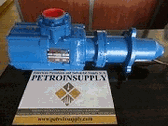Inspection Procedures Reciprocating Pump
Daily
Check the Lube Oil Pressure and Temperature (Max. 130F at cooler outlet)
Semi-monthly
Change lube oil 30 days after starting new pump and every six months after that. If the temperature fluctuates or there is high humidity the crankshaft should be checked for water condensation.
Monthly
Plunger rod bushings should be checked for leaks at the threads.
Semi-annual
Change the lube oil. Check the connection rod bolts for torque (see the manual).
Use the manual to check the running clearances for the connecting rod crankend bearing, connecting rod crosshead bearing, crosshead, gear case, outboard and pinion bearing. Check the valve and spring retainers for
wear and corrosion.
Annually
Check all internal, external frame and fluid end bolting. Check the lube oil pump.
If low oil pressure occurs in the power end it indicates that there is excessive clearance in the working parts.
Bearings and crosshead should be checkedfor wear and re-adjusted or replaced.
Noise or loss of pressure and/or capacity in the fluid end indicates thatthe valves are malfunctioning. Valves should be inspected for worn or damaged parts and proper seating. Repair, reface or replace as needed.
Wear in the bushings and plunger can cause frequent adjustment or replacement of the packing. If this happens the bushings and plunger should be checked for the wear and replaced as needed.
Indications that an overhaul ormajor repairs may be needed.
Records should be kept of the hours per gallon of oil used in the crankcase. If the consumption goes up beyond an economical range something should be done. The exact amount of oil consumption can be measured by using a oil reservoir, gauges or adding oil by hand.
The condition of the oil should be checked when the oil is changed every six months. The general condition of the oil should be noted and if there is water, sludge, Babbitt, or metal cuttings in the oil.
The crankcase inspection is oneof the most revealing inspections. As each door is removed, its back should be inspected for foreign material thrown there by centrifugal force of the connecting rod. Bronze cuttings from a faulty crosshead bushing will adhere to the door. The sameis true for Babbitt from bearings and cast iron from ways and crossheads. All nuts and bolts should be tapped with a hammer for familiar ring common to tightness.
Each piston should be moved to top center and the liner checked for scuffing.
The operator should become familiar with the natural beatof the machine by simply listening for unusual noises or sounds. Knocks, noises, and vibration are good indicatorsof trouble. A stethoscope can be an aid to locating various noises such as leaking valves.
Excessive leakage at stuffing boxes indicates that there is excessive wear on the packing, plungers and or stuffing box trim.
Excessive or increasing vibration indicates that parts may be worn or loose or may indicate other symptoms such as improper valve action, starvation and cavitation fromthe suction system as well as a variety of different conditions which indicate inspection and maintenance are required.
If the pump is generating higher than normal temperatures it indicates excessive wear of mating parts or excessive wear. Two mating parts thathave a tendency to seize while inoperation will generate enough local heat to discolor the casting supporting them. This is especially true of main and connecting rod bearing caps or the crosshead pin end of the connecting rod. Any parts thathave been discolored blue will normally be warped, cracked or both.
Lifetime is normal use without sand or cavitation inthe fluid end and no cavitation in the power end.
|
Component |
Average Lifetime in Hours |
|
Crankshaft |
60,000 |
|
Connecting Rod |
65,000 |
|
Crosshead |
40,000 |
|
Crosshead Pins |
40,000 |
|
Pull Rods |
30,000 |
|
Taper Roller Bearings |
40,000 |
|
Crankpin Bearing |
40,000 |
|
Crosshead Pin Bearing |
40,000 |
|
Main Bearing |
40,000 |
|
Cylinder Block |
120,000 |
|
Valve Components |
6,000 to 8,000 |
|
Stuffing Box Barrels |
8,000 |
|
Plunger |
10,000 |
|
Packing - Normal |
2,000 to 4,000 |
|
Packing - Severe |
1,500 |



